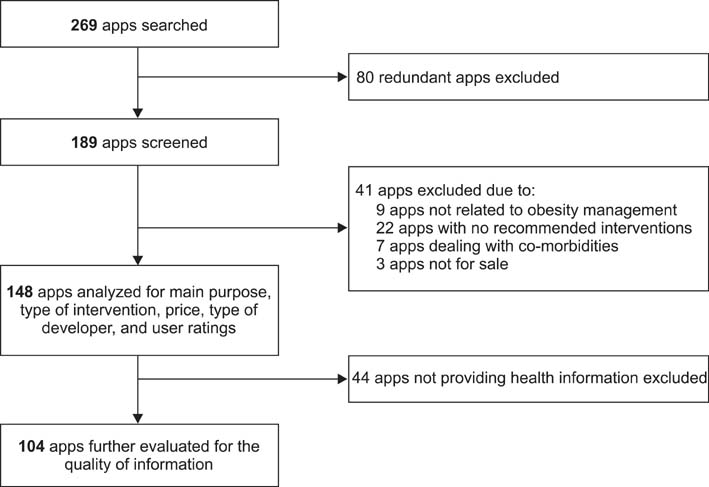Healthc Inform Res.
2014 Jan;20(1):23-29. 10.4258/hir.2014.20.1.23.
Analysis of the Information Quality of Korean Obesity-Management Smartphone Applications
- Affiliations
-
- 1College of Nursing, Seoul National University, Seoul, Korea. hapark@snu.ac.kr
- 2Research Institute of Nursing Science, Seoul National University, Seoul, Korea.
- 3College of Nursing, Eulji University, Daejeon, Korea.
- KMID: 2166735
- DOI: http://doi.org/10.4258/hir.2014.20.1.23
Abstract
OBJECTIVES
This study analyzed smartphone obesity-management applications developed in Korea and the quality of the information that they provide.
METHODS
Obesity-management smartphone applications were searched using the keywords 'obesity + management,' 'weight + management,' 'weight + loss,' 'weight + exercise,' 'weight + diet,' 'weight + calories,' and 'diet,' with a search application programming interface (provided by Apple) between September 23 and September 27, 2013. These applications were then classified according to their main purpose, type of interventions used, price, type of developer, and user ratings. The information quality of the applications was analyzed using the Silberg scale.
RESULTS
In total, 148 smartphone applications for obesity management were found. The main purpose of most of these applications (70.95%) was to provide information regarding weight control. The most frequently used intervention (34.62%) was to provide information on exercise management. More than half of the applications (58.78%) were free of charge. The mean of users' rating of these applications was 3.68 out of 5. The quality of information provided by these applications was evaluated as 4.55 out of 9: specifically, 1.79 out of 3 for authorship, 0.22 out of 2 for attribution, 1.29 out of 2 for disclosure, and 1.25 out of 2 for currency. Only three of the applications (2.88%) had a score on the Silberg scale greater than or equal to 7 points.
CONCLUSIONS
The findings of this study suggest that the quality of information provided by smartphone applications in the healthcare domain urgently need to be evaluated to prevent users being misinformed by these applications.
MeSH Terms
Figure
Cited by 4 articles
-
Health Avatar: An Informatics Platform for Personal and Private Big Data
Ju Han Kim
Healthc Inform Res. 2014;20(1):1-2. doi: 10.4258/hir.2014.20.1.1.Development of a Smartphone Application for Clinical-Guideline-Based Obesity Management
Eunjoo Jeon, Hyeoun-Ae Park
Healthc Inform Res. 2015;21(1):10-20. doi: 10.4258/hir.2015.21.1.10.Factors Affecting Acceptance of Smartphone Application for Management of Obesity
Eunjoo Jeon, Hyeoun-Ae Park
Healthc Inform Res. 2015;21(2):74-82. doi: 10.4258/hir.2015.21.2.74.Development of Child-Teen Obesity Treatment Service Platform
Kahyun Lim, Byung Mun Lee, Youngho Lee
Healthc Inform Res. 2016;22(3):243-249. doi: 10.4258/hir.2016.22.3.243.
Reference
-
1. Jeon HO, Kim O. The effects of an internet based coaching program for obesity management in hypertensive patients. Korean J Adult Nurs. 2011; 23(2):146–159.2. Patrick K, Griswold WG, Raab F, Intille SS. Health and the mobile phone. Am J Prev Med. 2008; 35(2):177–181.
Article3. Mosa AS, Yoo I, Sheets L. A systematic review of healthcare applications for smartphones. BMC Med Inform Decis Mak. 2012; 12:67.
Article4. Research2guidance. Mobile health market report 2010-2015: the impact of smartphone applications on the mobile health industry. Berlin: Research2guidance;2010.5. Liu C, Zhu Q, Holroyd KA, Seng EK. Status and trends of mobile-health applications for iOS devices: a developer's perspective. J Syst Softw. 2011; 84(11):2022–2033.
Article6. Pandolfini C, Impicciatore P, Bonati M. Parents on the web: risks for quality management of cough in children. Pediatrics. 2000; 105(1):e1.
Article7. Gan KO, Allman-Farinelli M. A scientific audit of smartphone applications for the management of obesity. Aust N Z J Public Health. 2011; 35(3):293–294.
Article8. Silberg WM, Lundberg GD, Musacchio RA. Assessing, controlling, and assuring the quality of medical information on the Internet: Caveant lector et viewor: let the reader and viewer beware. JAMA. 1997; 277(15):1244–1245.
Article9. Griffiths KM, Christensen H. Quality of Web based information on treatment of depression: cross sectional survey. BMJ. 2000; 321(7275):1511–1515.
Article10. National Heart, Lung, and Blood Institute. National Institute of Diabetes and Digestive and Kidney Diseases. Clinical guidelines on the identification, evaluation, and treatment of overweight and obesity in adults: the evidence report. Bethesda (MD): National Heart, Lung, and Blood Institute;1998.11. National Institute for Health and Clinical Excellence. Obesity: the prevention, identification, assessment and management of overweight and obesity in adults and children. London: National Institute for Health and Clinical Excellence;2006.12. Lee JW, Kim JD, Jia L. A present condition of smartphone health application. Korean Soc Design Sci;2010. 10. p. 210–211.13. Eysenbach G, Powell J, Kuss O, Sa ER. Empirical studies assessing the quality of health information for consumers on the World Wide Web: a systematic review. JAMA. 2002; 287(20):2691–2700.
Article14. Eysenbach G. Design and evaluation of consumer health information Web sites. Consumer health informatics. New York: Springer;2005. p. 34–60.15. Logan AG, McIsaac WJ, Tisler A, Irvine MJ, Saunders A, Dunai A, et al. Mobile phone-based remote patient monitoring system for management of hypertension in diabetic patients. Am J Hypertens. 2007; 20(9):942–948.
Article16. Zermatten A, Khazaal Y, Coquard O, Chatton A, Bondolfi G. Quality of Web-based information on depression. Depress Anxiety. 2010; 27(9):852–858.
Article17. Morel V, Chatton A, Cochand S, Zullino D, Khazaal Y. Quality of Web-based information on bipolar disorder. J Affect Disord. 2008; 110(3):265–269.
Article18. Demidowich AP, Lu K, Tamler R, Bloomgarden Z. An evaluation of diabetes self-management applications for Android smartphones. J Telemed Telecare. 2012; 18(4):235–238.
Article
- Full Text Links
- Actions
-
Cited
- CITED
-
- Close
- Share
- Similar articles
-
- The Meaning of Information Technology (IT) Mobile Devices to Me, the Infectious Disease Physician
- The Use of Smartphone Applications in Stroke Rehabilitation in Korea
- Smartphone Use Patterns of Smartphone-dependent Children
- Smartphone Applications Providing Information about Stroke: Are We Missing Stroke Risk Computation Preventive Applications?
- Response: Smartphone Applications Providing Information about Stroke: Are We Missing Stroke Risk Computation Preventive Applications?


